ArmamentScienceandTechnology兵器科学与技术(082600)
中国大学专业中英文对照

中国大学专业中英文对照哲学Philosophy马克思主义哲学Philosophy of Marxism中国哲学Chinese Philosophy外国哲学Foreign Philosophies逻辑学Logic伦理学Ethics美学Aesthetics宗教学Science of Religion科学技术哲学Philosophy of Science and Technology经济学Economics理论经济学Theoretical Economics政治经济学Political Economy经济思想史History of Economic Thought经济史History of Economic西方经济学Western Economics世界经济World Economics人口、资源与环境经济学Population, Resources and Environmental Economics应用经济学Applied Economics国民经济学National Economics区域经济学Regional Economics财政学(含税收学)Public Finance (including Taxation)金融学(含保险学)Finance (including Insurance)产业经济学Industrial Economics国际贸易学International Trade劳动经济学Labor Economics统计学Statistics数量经济学Quantitative Economics中文学科、专业名称英文学科、专业名称国防经济学National Defense Economics法学Law法学Science of Law法学理论Jurisprudence法律史Legal History宪法学与行政法学Constitutional Law and Administrative Law刑法学Criminal Jurisprudence民商法学(含劳动法学、社会保障法学) Civil Law and Commercial Law (including Science of Labour Law and Science of Social Security Law )诉讼法学Science of Procedure Laws经济法学Science of Economic Law环境与资源保护法学Science of Environment and Natural Resources Protection Law国际法学(含国际公法学、国际私法学、国际经济法学、) International law (includingInternational Public law, International Private Law and International Economic Law)军事法学Science of Military Law政治学Political Science政治学理论Political Theory中外政治制度Chinese and Foreign Political Institution科学社会主义与国际共产主义运动Scientific Socialism and InternationalCommunist Movement中共党史(含党的学说与党的建设) History of the Communist Party of China(including the Doctrine of China Party and Party Building)马克思主义理论与思想政治教育Education of Marxist Theory and Education in Ideology and Politics国际政治学International Politics国际关系学International Relations外交学Diplomacy社会学Sociology社会学Sociology人口学Demography人类学Anthropology民俗学(含中国民间文学) Folklore (including Chinese Folk Literature)民族学Ethnology民族学Ethnology马克思主义民族理论与政策Marxist Ethnic Theory and Policy中国少数民族经济Chinese Ethnic Economics中国少数民族史Chinese Ethnic History中国少数民族艺术Chinese Ethnic Art教育学Education教育学Education Science教育学原理Educational Principle课程与教学论Curriculum and Teaching Methodology教育史History of Education比较教育学Comparative Education学前教育学Pre-school Education高等教育学Higher Education成人教育学Adult Education职业技术教育学V ocational and Technical Education特殊教育学Special Education教育技术学Education Technology心理学Psychology基础心理学Basic Psychology发展与心理学Developmental and Educational Psychology应用心理学Applied Psychology体育学Science of Physical Culture and Sports体育人文社会学Humane and Sociological Science of Sports运动人体科学Human Movement Science体育教育训练学Theory of Sports Pedagogy and Training民族传统体育学Science of Ethnic Traditional Sports文学Literature中国语言文学Chinese Literature文艺学Theory of Literature and Art语言学及应用语言学Linguistics and Applied Linguistics汉语言文字学Chinese Philology中国古典文献学Study of Chinese Classical Text中国古代文学Ancient Chinese Literature中国现当代文学Modern and Contemporary Chinese Literature中国少数民族语言文学Chinese Ethnic Language andLiterature比较文学与世界文学Comparative Literature and World Literature外国语言文学Foreign Languages and Literatures英语语言文学English Language and Literature俄语语言文学Russian Language and Literature法语语言文学French Language and Literature德语语言文学German Language and Literature日语语言文学Japanese Language and Literature印度语言文学Indian Language and Literature西班牙语语言文学Spanish Language and Literature阿拉伯语语言文学Arabic Language and Literature欧洲语言文学European Language and Literature亚非语言文学Asian-African Language and Literature外国语言学及应用语言学Linguistics and Applied Linguistics inForeign Languages新闻传播学Journalism and Communication新闻学Journalism传播学Communication艺术学Art艺术学Art Theory音乐学Music美术学Fine Arts设计艺术学Artistic Design戏剧戏曲学Theater and Chinese Traditional Opera电影学Film广播电视艺术学Radio and television Art舞蹈学Dance历史学History历史学History史学理论及史学史Historical Theories and History of Historical Science考古学及博物馆学Archaeology and Museology历史地理学Historical Geography历史文献学(含敦煌学、古文字学) Studies of Historical Literature (includingPaleography and Studies of Dunhuang)专门史History of Particular Subjects中国古代史Ancient Chinese History中国近现代史Modern and Contemporary Chinese History世界史World History理学Natural Science数学Mathematics基础数学Fundamental Mathematics计算数学Computational Mathematics概率论与数理统计Probability and Mathematical Statistics应用数学Applied Mathematics运筹学与控制论Operational Research and Cybernetics物理学Physics理论物理Theoretical Physics粒子物理与原子核物理Particle Physics and Nuclear Physics原子与分子物理Atomic and Molecular Physics等离子体物理Plasma Physics凝聚态物理Condensed Matter Physics声学Acoustics光学Optics无线电物理Radio Physics化学Chemistry无机化学Inorganic Chemistry分析化学Analytical Chemistry有机化学Organic Chemistry物理化学(含化学物理)Physical Chemistry (including Chemical Physics) 高分子化学与物理Chemistry and Physics of Polymers天文学Astronomy天体物理Astrophysics天体测量与天体力学Astrometry and Celestial Mechanics地理学Geography自然地理学Physical Geography人文地理学Human Geography地图学与地理信息系统Cartography and Geography Information System大气科学Atmospheric Sciences气象学Meteorology大气物理学与大气环境Atmospheric Physics and Atmospheric Environment 海洋科学Marine Sciences物理海洋学Physical Oceanography海洋化学Marine Chemistry海洋生理学Marine Biology海洋地质学Marine Geology地球物理学Geophysics固体地球物理学Solid Earth Physics空间物理学Space Physics地质学Geology矿物学、岩石学、矿床学Mineralogy, Petrology, Mineral Deposit Geology 地球化学Geochemistry古生物学与地层学(含古人类学)Paleontology and Stratigraphy (including Paleoanthropology)构造地质学Structural Geology第四纪地质学Quaternary Geology生物学Biology植物学Botany动物学Zoology生理学Physiology水生生物学Hydrobiology微生物学Microbiology神经生物学Neurobiology遗传学Genetics发育生物学Developmental Biology细胞生物学Cell Biology生物化学与分子生物学Biochemistry and Molecular Biology生物物理学Biophysics生态学Ecology系统科学Systems Science系统理论Systems Theory系统分析与集成Systems Analysis and Integration科学技术史History of Science and Technology工学Engineering力学Mechanics一般力学与力学基础General and Fundamental Mechanics固体力学Solid Mechanics流体力学Fluid Mechanics工程力学Engineering Mechanics机械工程Mechanical Engineering机械制造及其自动化Mechanical Manufacture and Automation机械电子工程Mechatronic Engineering机械设计与理论Mechanical Design and Theory车辆工程Vehicle Engineering光学工程Optical Engineering仪器科学与技术Instrument Science and Technology精密仪器及机械Precision Instrument and Machinery测试计量技术及仪器Measuring and Testing Technologies and Instruments材料科学与工程Materials Science and Engineering材料物理与化学Materials Physics and Chemistry材料学Materialogy材料加工工程Materials Processing Engineering冶金物理化学Physical Chemistry of Metallurgy钢铁冶金Ferrous Metallurgy有色金属冶金Non-ferrous Metallurgy动力工程及工程热物理Power Engineering and Engineering Thermophysics工程热物理Engineering Thermophysics热能工程Thermal Power Engineering动力机械及工程Power Machinery and Engineering流体机械及工程Fluid Machinery and Engineering制冷及低温工程Refrigeration and Cryogenic Engineering化工过程机械Chemical Process Equipment电气工程Electrical Engineering电机与电器Electric Machines and Electric Apparatus电力系统及其自动化Power System and its Automation高电压与绝缘技术High V oltage and Insulation Technology电力电子与电力传动Power Electronics and Power Drives电工理论与新技术Theory and New Technology of Electrical Engineering电子科学与技术Electronics Science and Technology物理电子学Physical Electronics电路与系统Circuits and Systems微电子学与固体电子学Microelectronics and Solid State Electronics电磁场与微波技术Electromagnetic Field and Microwave Technology信息与通信工程Information and Communication Engineering通信与信息系统Communication and Information Systems信号与信息处理Signal and Information Processing控制科学与工程Control Science and Engineering控制理论与控制工程Control Theory and Control Engineering检测技术与自动化装置Detection Technology and Automatic Equipment系统工程Systems Engineering模式识别与智能系统Pattern Recognition and Intelligent Systems导航、制导与控制Navigation, Guidance and Control计算机科学与技术Computer Science and Technology计算机软件与理论Computer Software and Theory计算机系统结构Computer Systems Organization计算机应用技术Computer Applied Technology建筑学Architecture建筑历史与理论Architectural History and Theory建筑设计及其理论Architectural Design and Theory城市规划与设计(含风景园林规划与设计)Urban Planning and Design (including Landscape Planning and Design)建筑技术科学Building Technology Science土木工程Civil Engineering岩土工程Geotechnical Engineering结构工程Structural Engineering供热、供燃气、通风及空调工程Heating, Gas Supply, Ventilating and Air Conditioning Engineering防灾减灾工程及防护工程Disaster Prevention and Reduction Engineering and Protective Engineering桥梁与隧道工程Bridge and Tunnel Engineering水利工程Hydraulic Engineering水文学及水资源Hydrology and Water Resources水力学及河流动力学Hydraulics and River Dynamics水工结构工程Hydraulic Structure Engineering水利水电工程Hydraulic and Hydro-Power Engineering港口、海岸及近海工程Harbor, Coastal and Offshore Engineering测绘科学与技术Surveying and Mapping大地测量学与测量工程Geodesy and Survey Engineering摄影测量与遥感Photogrammetry and Remote Sensing地图制图学与地理信息工程Cartography and Geographic Information Engineering化学工程与技术Chemical Engineering and Technology化学工程Chemical Engineering化学工艺Chemical Technology生物化工Biochemical Engineering应用化学Applied Chemistry工业催化Industrial Catalysis地质资源与地质工程Geological Resources and Geological Engineering矿产普查与勘探Mineral Resource Prospecting and Exploration地球探测与信息技术Geodetection and Information Technology地质工程Geological Engineering矿业工程Mineral Engineering采矿工程Mining Engineering矿物加工工程Mineral Processing Engineering安全技术及工程Safety Technology and Engineering石油与天然气工程Oil and Natural Gas Engineering油气井工程Oil-Gas Well Engineering油气田开发工程Oil-Gas Field Development Engineering油气储运工程Oil-Gas Storage and Transportation Engineering纺织科学与工程Textile Science and Engineering纺织工程Textile Engineering纺织材料与纺织品设计Textile Material and Textiles Design纺织化学与染整工程Textile Chemistry and Dyeing and Finishing Engineering服装设计与工程Clothing Design and Engineering轻工技术与工程The Light Industry Technology and Engineering制浆造纸工程Pulp and Paper Engineering制糖工程Sugar Engineering发酵工程Fermentation Engineering皮革化学与工程Leather Chemistry and Engineering交通运输工程Communication and Transportation Engineering道路与铁道工程Highway and Railway Engineering交通信息工程及控制Traffic Information Engineering & Control交通运输规划与管理Transportation Planning and Management载运工具运用工程Vehicle Operation Engineering船舶与海洋工程Naval Architecture and Ocean Engineering船舶与海洋结构物设计制造Design and Construction of Naval Architecture and Ocean Structure轮机工程Marine Engine Engineering水声工程Underwater Acoustics Engineering航空宇航科学与技术Aeronautical and Astronautical Science and Technology飞行器设计Flight Vehicle Design航空宇航推进理论与工程Aerospace Propulsion Theory and Engineering航空宇航器制造工程Manufacturing Engineering of Aerospace Vehicle人机与环境工程Man-Machine and Environmental Engineering兵器科学与技术Armament Science and Technology武器系统与运用工程Weapon Systems and Utilization Engineering兵器发射理论与技术Armament Launch Theory and Technology火炮、自动武器与弹药工程Artillery, Automatic Gun and Ammunition Engineering军事化学与烟火技术Military Chemistry and Pyrotechnics核科学与技术Nuclear Science and Technology核能科学与工程Nuclear Energy Science and Engineering核燃料循环与材料Nuclear Fuel Cycle and Materials核技术及应用Nuclear Technology and Applications辐射防护及环境保护Radiation and Environmental Protection农业工程Agricultural Engineering农业机械化工程Agricultural Mechanization Engineering农业水土工程Agricultural Water-Soil Engineering农业生物环境与能源工程Agricultural Biological Environmental and Energy Engineering农业电气化与自动化Agricultural Electrification and Automation林业工程Forestry Engineering森林工程Forest Engineering木材科学与技术Wood Science and Technology林产化学加工工程Chemical Processing Engineering of Forest Products环境科学与工程Environmental Science and Engineering环境科学Environmental Science环境工程Environmental Engineering生物医学工程Biomedical Engineering食品科学与工程Food Science and Engineering食品科学Food Science粮食、油脂及植物蛋白工程Cereals, Oils and Vegetable Protein Engineering农产品加工及贮藏工程Processing and Storage of Agriculture Products水产品加工及贮藏工程Processing and Storage of Aquatic Products农学Agriculture作物学Crop Science作物栽培学与耕作学Crop Cultivation and Farming System作物遗传育种学Crop Genetics and Breeding园艺学Horticulture果树学Pomology蔬菜学Olericulture茶学Tea Science农业资源利用学Utilization Science of Agricultural Resources土壤学Soil Science植物营养学Plant Nutrition植物保护学Plant Protection植物病理学Plant Pathology农业昆虫与害虫防治Agricultural Entomology and Pest Control农药学Pesticide Science畜牧学Animal Science动物遗传育种与繁殖Animal Genetics, Breeding and ReproductionScience动物营养与饲料科学Animal Nutrition and Feed Science草业科学Practaculture Science特种经济动物饲养学(含蚕、蜂等)The Rearing of Special-type Economic Animals (including Silkworm, Honeybees, etc.)兽医学Veterinary Medicine基础兽医学Basic Veterinary Medicine预防兽医学Preventive Veterinary Medicine临床兽医学Clinical Veterinary Medicine林学Forestry林木遗传育种学Forest Tree Genetics and Breeding森林培育学Silviculture森林保护学Forest Protection森林经理学Forest Management野生动植物保护与利用Wildlife Conservation and Utilization园林植物与观赏园艺Ornamental Plants and Horticulture水土保持与荒漠化防治Soil and Water Conservation and Desertification Combating 水产学Fisheries Science水产养殖学Aquaculture Science捕捞学Fishing Science渔业资源学Science of Fisheries Resources医学Medicine基础医学Basic Medicine人体解剖与组织胚胎学Human Anatomy, Histology and Embryology免疫学Immunology病原生物学Pathogenic Organisms病理学与病理生理学Pathology and Pathophysiology法医学Forensic Medicine放射医学Radiation Medicine航空航天与航海医学Aerospace and Nautical medicine临床医学Clinical Medicine内科学(含心血管病学、血液病学、呼吸系病学、消化系病学、内分泌与代谢病学、肾脏病学、风湿病学、传染病学)Internal medicine (including Cardiology, Hematology, Respiratory, Gastroenterology, Endocrinology and Metabolism, Nephrology, Rheuma-tology, Infectious Diseases)儿科学Pediatrics老年医学Geriatrics神经病学Neurology精神病与精神卫生学Psychiatry and Mental Health皮肤病与性病学Dermatology and Venereology影像医学与核医学Imaging and Nuclear Medicine临床检验诊断学Clinical Laboratory Diagnostics护理学Nursing外科学(含普通外科学、骨外科学、泌尿外科学、胸心血管外科学、神经外科学、整形外科学、烧伤外科学、野战外科学)Surgery (General Surgery, Orthopedics, Urology, Cardiothoracic Surgery, Neurosurgery, Plastic Surgery, Burn Surgery, Field Surgery)妇产科学Obstetrics and Gynecology眼科学Ophthalmic Specialty耳鼻咽喉科学Otolaryngology肿瘤学Oncology康复医学与理疗学Rehabilitation Medicine & Physical Therapy运动医学Sports Medicine麻醉学Anesthesiology急诊医学Emergency Medicine口腔医学Stomatology口腔基础医学Basic Science of Stomatology口腔临床医学Clinical Science of Stomatology公共卫生与预防医学Public Health and Preventive Medicine流行病与卫生统计学Epidemiology and Health Statistics劳动卫生与环境卫生学Occupational and Environmental Health营养与食品卫生学Nutrition and Food Hygiene儿少卫生与妇幼保健学Maternal, Child and Adolescent Health卫生毒理学Hygiene Toxicology军事预防医学Military Preventive Medicine中医学Chinese Medicine中医基础理论Basic Theories of Chinese Medicine中医临床基础Clinical Foundation of Chinese Medicine中医医史文献History and Literature of Chinese Medicine方剂学Formulas of Chinese Medicine中医诊断学Diagnostics of Chinese Medicine中医内科学Chinese Internal Medicine中医外科学Surgery of Chinese Medicine中医骨伤科学Orthopedics of Chinese Medicine中医妇科学Gynecology of Chinese Medicine中医儿科学Pediatrics of Chinese Medicine中医五官科学Ophthalmology and Otolaryngoloy of Chinese Medicine针灸推拿学Acupuncture and Moxibustion and Tuina of Chinese medicine民族医学Ethnomedicine中西医结合医学Chinese and Western Integrative Medicine中西医结合基础医学Basic Discipline of Chinese and Western Integrative中西医结合临床医学Clinical Discipline of Chinese and Western Integrative Medicine药学Pharmaceutical Science药物化学Medicinal Chemistry药剂学Pharmaceutics生药学Pharmacognosy药物分析学Pharmaceutical Analysis微生物与生化药学Microbial and Biochemical Pharmacy药理学Pharmacology中药学Science of Chinese Pharmacology军事学Military Science军事思想学及军事历史学Military Thought and Military History军事思想学Military Thought军事历史学Military History战略学Science of Strategy军事战略学Military Strategy战争动员学War Mobilization战役学Science of Operations联合战役学Joint Operation军种战役学(含第二炮兵战役学)Armed Service Operation (including Operation of Strategic Missile Force)战术学Science of Tactics合同战术学Combined-Arms Tactics兵种战术学Branch Tactics军队指挥学Science of Command作战指挥学Combat Command军事运筹学Military Operation Research军事通信学Military Communication军事情报学Military Intelligence密码学Cryptography军事教育训练学(含军事体育学)Military Education and Training (including Military Physical Training)军制学Science of Military System军事组织编制学Military Organizational System军队管理学Military Management军队政治工作学Science of Military Political Work军事后勤学与军事装备学Science of Military Logistics and Military Equipment军事后勤学Military Logistics后方专业勤务Rear Special Service军事装备学Military Equipment管理学Management Science管理科学与工程Management Science and Engineering工商管理学Science of Business Administration会计学Accounting企业管理学(含财务管理、市场营销学、人力资源管理学)Corporate Management (including Financial Management, Marketing, and Human Resources Management)旅游管理学Tourist Management技术经济及管理学Technology Economy and Management农林经济管理学Agricultural and Forestry Economics & Management农业经济管理学Agricultural Economics & Management林业经济管理学Forestry Economics & Management公共管理学Science of Public Management行政管理学Administration Management社会医学与卫生事业管理学Social Medicine and Health Management教育经济与管理学Educational Economy and Management社会保障学Social Security土地资源管理学Land Resource Management图书馆、情报与档案学Science of Library, Information and Archival图书馆学Library Science情报学Information Science档案学Archival Science工程硕士Engineering Master领域名称Domain Title ……………………………………………………………………………………………工程硕士领域工程硕士领域英文名称机械工程Mechanical Engineering光学工程Optical Engineering仪器仪表工程Instrument and Meter Engineering材料工程Material Engineering冶金工程Metallurgy Engineering动力工程Power Engineering电气工程Electrical Engineering电子与通信工程Electrical and Communication Engineering控制工程Control Engineering计算机技术Computer Technology软件工程Software Engineering建筑与土木工程Architectural and Civil Engineering水利工程Hydraulic Engineering测绘工程Surveying and Mapping Engineering化学工程Chemical Engineering地质工程Geological Engineering矿业工程Mining Engineering石油与天然气工程Petroleum and Natural Gas Engineering纺织工程Textile Engineering轻工技术与工程Light Industry Technology and Engineering交通运输工程Communication and Transportation Engineering船舶与海洋工程Shipbuilding and Oceanography Engineering兵器工程Arms Engineering核能与核技术工程Nuclear Energy and Nuclear Technology农业工程Agricultural Engineering林业工程Forestry Engineering环境工程Environmental Engineering生物医学工程Biomedical Engineering食品工程Foodstuff Engineering航空工程Aeronautical Engineering航天工程Aerospace Engineering车辆工程Vehicle Engineering制药工程Pharmaceutical Engineering工业工程Industrial Engineering工业设计工程Industrial Design Engineering生物工程Biotechnology Engineering项目管理Project Management物流工程Logistics Engineering工商管理硕士Master of Business Administration-----------------------------------------------------------------------------------------------------------。
兵器科学与技术学科博士研究生培养方案2019 (2)
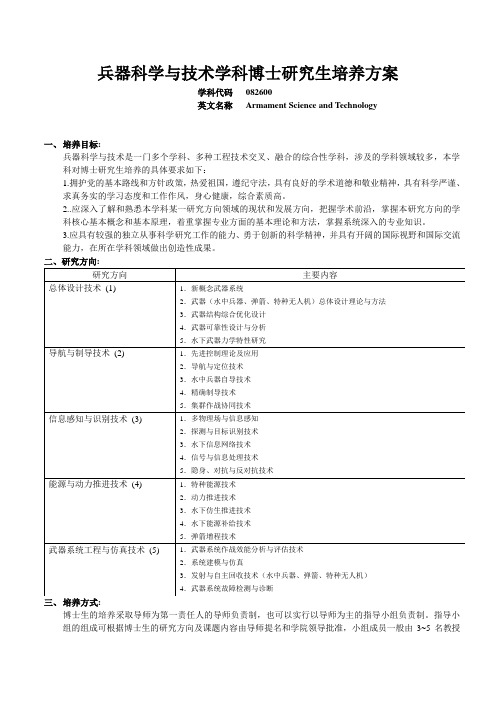
兵器科学与技术学科博士研究生培养方案学科代码082600英文名称Armament Science and Technology一、培养目标:兵器科学与技术是一门多个学科、多种工程技术交叉、融合的综合性学科,涉及的学科领域较多,本学科对博士研究生培养的具体要求如下:1.拥护党的基本路线和方针政策,热爱祖国,遵纪守法,具有良好的学术道德和敬业精神,具有科学严谨、求真务实的学习态度和工作作风,身心健康,综合素质高。
2..应深入了解和熟悉本学科某一研究方向领域的现状和发展方向,把握学术前沿,掌握本研究方向的学科核心基本概念和基本原理,着重掌握专业方面的基本理论和方法,掌握系统深入的专业知识。
3.应具有较强的独立从事科学研究工作的能力、勇于创新的科学精神,并具有开阔的国际视野和国际交流能力,在所在学科领域做出创造性成果。
二、研究方向:博士生的培养采取导师为第一责任人的导师负责制,也可以实行以导师为主的指导小组负责制。
指导小组的组成可根据博士生的研究方向及课题内容由导师提名和学院领导批准,小组成员一般由3~5名教授(含导师)组成,但博士生导师在博士生培养中起主导作用。
四、培养类型与学习年限:博士研究生根据选拔方式的不同,分为三种类型:1. 公开招考;2. 硕博连读;3. 直接攻博。
博士研究生一般在入学后两年内完成课程学习,直博生不超过两年半。
用于科学研究和撰写学位论文的时间不少于两年。
公开招考博士研究生的学习年限一般为3~5年。
硕博连读和直接攻博博士研究生的学习年限一般为5~7年。
五、课程设置:备注G1公共课(学位必修课,在下列课程中至少选4学分)G2基础理论课(学位必修课,在硕士生课程中至少选修5学分,博士生课程至少选修2学分)G3公共实验课(至少选一门公共实验课)M2专业基础课(学位必修课,在下列课程中至少选8学分)M1专业课(学位选修课,在下列课程中至少选2学分,其余可在全校任选)A博士学科前沿课(学位选修课,至少选1学分)L综合素养课(学位选修课,其中学术道德规范与人文素养必选,其余课程不计入最低总学分)L1跨一级学科课程(学位选修课,在其他一级学科中选修)六、培养环节:1.课程学习课程学习是博士研究生重要的培养环节,需达到相关学分要求。
兵器科学与技术学科博士研究生培养方案2019(2)
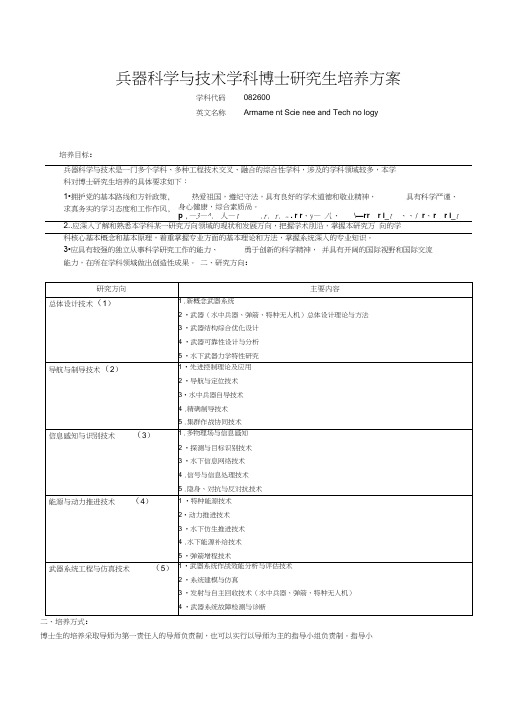
兵器科学与技术学科博士研究生培养方案学科代码082600英文名称Armame nt Scie nee and Tech no logy 培养目标:二、培养万式:博士生的培养采取导师为第一责任人的导师负责制,也可以实行以导师为主的指导小组负责制。
指导小组的组成可根据博士生的研究方向及课题内容由导师提名和学院领导批准,小组成员一般由3~5名教授(含导师)组成,但博士生导师在博士生培养中起主导作用。
四、培养类型与学习年限:博士研究生根据选拔方式的不同,分为三种类型: 1.公开招考;2.硕博连读;3.直接攻博。
博士研究生一般在入学后两年内完成课程学习,直博生不超过两年半。
用于科学研究和撰写学位论文的时间不少于两年。
公开招考博士研究生的学习年限一般为3~5年。
硕博连读和直接攻博博士研究生的学习年限一般为5~7年。
五、课程设置:博士研究生课程至少选修14学分。
G1公共课(学位必修课,在下列课程中至少选4学分)G2基础理论课(学位必修课,在硕士生课程中至少选修5学分,博士生课程至少选修2学分)G3公共实验课(至少选一门公共实验课)M2专业基础课(学位必修课,在下列课程中至少选8学分)M1专业课(学位选修课,在下列课程中至少选2学分,其余可在全校任选)A博士学科前沿课(学位选修课,至少选1学分)L综合素养课(学位选修课,其中学术道德规范与人文素养必选,其余课程不计入最低总学分)L1跨一级学科课程(学位选修课,在其他一级学科中选修)六、培养环节:1 •课程学习课程学习是博士研究生重要的培养环节,需达到相关学分要求。
(1)学术英语课程,博士生在达到相关要求后可申请免修;(2)学术道德规范与人文素养课程内容包括:科学道德与学术规范、知识产权、人文、艺术、心理学、学术文献查阅、学术论文撰写、科学研究方法、科研项目申请书撰写等内容;(3)跨一级学科课程各学科应选择其它一级学科课程目录中基础性强、覆盖面宽、教学效果好、学生选学人数多的专业课程作为跨一级学科课程,课程类别和数量由各一级学科自定;(4)学科前沿课程可由各学科邀请国内外知名专家学者为博士研究生讲授,参加名家讲堂或其它专家讲座可取得该课程学分;(5)直博生生应在导师指导下按培养方案制定课程计划,允许分阶段选课,但最迟须在入学后1年内完成选课。
中国教育部学科分类表

080503材料加工工程
0806冶金工程
080601冶金物理化学
080602钢铁冶金
080603有色金属冶金
0807动力工程及工程热物理
080701工程热物理
080702热能工程
080703动力机械及工程
080704流体机械及工程
080705制冷及低温工程
080706化工过程机械
0808电气工程
050405戏剧戏曲学
050406电影学
050407广播电视艺术学
050408舞蹈学
06历史学
0601历史学
060101史学理论及史学史
060102考古学及博物馆学
060103历史地理学
060104历史文献学(含:敦煌学、古文字学)
060105专门史
060106中国古代史
060107中国近现代史
060108世界史
100105法医学
100106放射医学
100107航空、航天与航海医学
1002临床医学
100201内科学(含:心血管病、血液病、呼吸 系病、消化系病、内分泌与代谢病、肾病、 风湿病、传染病)?
100202儿科学
100203老年医学
100204神经病学
100205精神病与精神卫生学
100206皮肤病与性病学
0823交通运输工程
082301道路与铁道工程
082302交通信息工程及控制
082303交通运输规划与管理
082304载运工具运用工程
0824船舶与海洋工程
082401船舶与海洋结构物设计制造
082402轮机工程
082403水声工程
0825航空宇航科学与技术
火炮,自动武器与弹药工程

火炮、自动武器与弹药工程082603(一级学科:兵器科学与技术)本学科1978年获得硕士学位授予权,1990年获得博士学位授予权,设有博士后流动站,2001年被评为国家重点学科。
以武器装备中各类弹药、战斗部(导弹有效载荷)、身管自动射击武器和民用爆破器材等为应用背景,综合应用数学、力学、机械电子技术和专业知识,以提高武器射程、精度/命中率、威力、安全和毁伤效能为研究目标,重点对高价值目标损伤特性、毁伤方式、武器终点效应、高效战斗部、灵巧弹药和智能小型发射平台进行理论研究和技术创新,为国防和国民经济建设服务。
本学科有以工程院院士牵头的一批高水平学科带头人,师资力量雄厚;本学科的实验室隶属于国家重点实验室,可为教学和科学研究提供良好的条件。
主要研究方向为:1.弹药与自动武器系统分析:弹药与自动武器系统设计理论与总体优化设计;弹道学;安全设计及可靠性;结构动力学;射击效率评估;数值模拟与数字仿真技术;数字虚拟现实技术。
2.高效毁伤战斗部技术:高效毁伤方法/模式和技术途径;毁伤理论与技术;软/非致命杀伤;威力设计与控制;战斗部结构技术;终点效应学。
3.目标易损性分析与毁伤效能评价:目标在不同作战条件下的易损特性;目标在冲击作用下的动态响应;目标在不同杀伤元素作用下的易损理论与损伤判据;易损性/生存力评价方法;武器终端毁伤效能评价。
4.弹药控制及灵巧技术:战斗部与引信的智能/最优配合技术;串联或并联弹药系统的威力控制技术;弹药的灵巧方式与飞行控制技术;末制导弹药技术。
5.智能化小型发射平台技术:智能化小型发射平台总体设计技术;环境/目标信息探测技术;智能运动控制技术;发射动力学与打击精度控制技术。
一、培养目标热爱祖国,有社会主义觉悟和较高道德修养,掌握本学科领域坚实宽广的基础理论和系统深入的专门知识,全面深入了解本学科现状与发展趋势,把握学术前沿,了解相邻学科发展,具有应用先进实验/工程/数值模拟手段独立从事本学科领域的科学研究、技术开发和工程设计等工作的能力,在科学研究或专门技术上做出创造性成果。
兵器科学与技术学科博士研究生培养方案2019
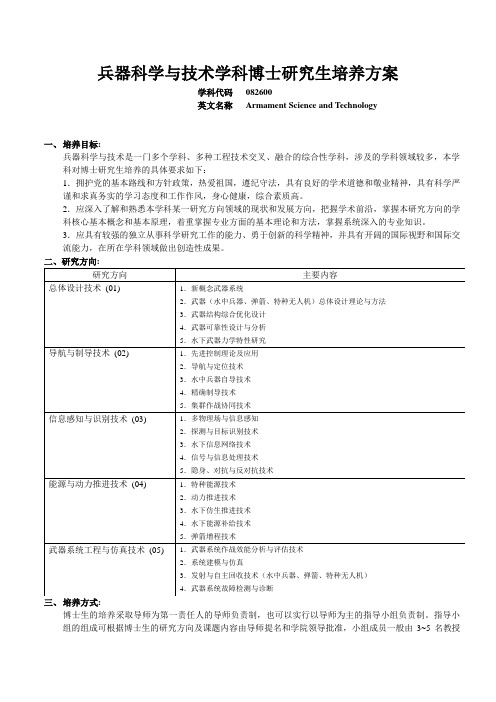
兵器科学与技术学科博士研究生培养方案学科代码082600英文名称Armament Science and Technology一、培养目标:兵器科学与技术是一门多个学科、多种工程技术交叉、融合的综合性学科,涉及的学科领域较多,本学科对博士研究生培养的具体要求如下:1.拥护党的基本路线和方针政策,热爱祖国,遵纪守法,具有良好的学术道德和敬业精神,具有科学严谨和求真务实的学习态度和工作作风,身心健康,综合素质高。
2.应深入了解和熟悉本学科某一研究方向领域的现状和发展方向,把握学术前沿,掌握本研究方向的学科核心基本概念和基本原理,着重掌握专业方面的基本理论和方法,掌握系统深入的专业知识。
3.应具有较强的独立从事科学研究工作的能力、勇于创新的科学精神,并具有开阔的国际视野和国际交流能力,在所在学科领域做出创造性成果。
二、研究方向:博士生的培养采取导师为第一责任人的导师负责制,也可以实行以导师为主的指导小组负责制。
指导小组的组成可根据博士生的研究方向及课题内容由导师提名和学院领导批准,小组成员一般由3~5名教授(含导师)组成,但博士生导师在博士生培养中起主导作用。
四、培养类型与学习年限:博士研究生根据选拔方式的不同,分为三种类型:1.公开招考;2.硕博连读;3.直接攻博。
博士研究生一般在入学后两年内完成课程学习,直博生不超过两年半。
用于科学研究和撰写学位论文的时间不少于两年。
公开招考博士研究生的学习年限一般为3~5年。
硕博连读和直接攻博博士研究生的学习年限一般为5~7年。
五、课程设置:1)博士研究生课程博士研究生课程总学分数应至少取得14学分,其中学位必修课至少8学分,包括公共课4学分,基础理论课2学分,专业基础课2学分;学位选修课至少6学分,包括专业课2学分、跨一级学科课程2学分、学科前沿课程1学分、综合素质课1学分。
G1公共课(学位必修课,在下列课程中至少选4学分)G2基础理论课(在下列课程中至少选2学分)M2专业基础课(学位必修课,在下列课程中至少选2学分)M1专业课(学位选修课,至少选2学分)A博士学科前沿课(学科前沿课程至少1学分)L综合素养课(学位选修课,至少选修《学术道德规范与人文素养》1学分,其他课程不计入最低总学分)L1跨一级学科课程(跨一级学科课程,在本学科培养方案以外课程中任选2学分。
兵器科学与技术基础学科
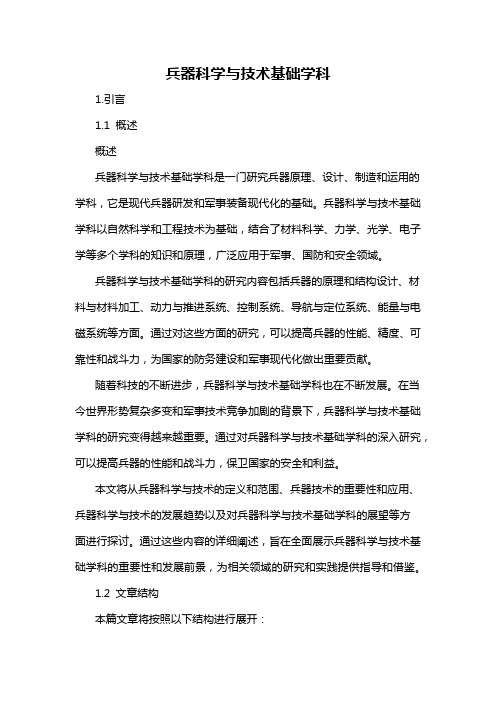
兵器科学与技术基础学科1.引言1.1 概述概述兵器科学与技术基础学科是一门研究兵器原理、设计、制造和运用的学科,它是现代兵器研发和军事装备现代化的基础。
兵器科学与技术基础学科以自然科学和工程技术为基础,结合了材料科学、力学、光学、电子学等多个学科的知识和原理,广泛应用于军事、国防和安全领域。
兵器科学与技术基础学科的研究内容包括兵器的原理和结构设计、材料与材料加工、动力与推进系统、控制系统、导航与定位系统、能量与电磁系统等方面。
通过对这些方面的研究,可以提高兵器的性能、精度、可靠性和战斗力,为国家的防务建设和军事现代化做出重要贡献。
随着科技的不断进步,兵器科学与技术基础学科也在不断发展。
在当今世界形势复杂多变和军事技术竞争加剧的背景下,兵器科学与技术基础学科的研究变得越来越重要。
通过对兵器科学与技术基础学科的深入研究,可以提高兵器的性能和战斗力,保卫国家的安全和利益。
本文将从兵器科学与技术的定义和范围、兵器技术的重要性和应用、兵器科学与技术的发展趋势以及对兵器科学与技术基础学科的展望等方面进行探讨。
通过这些内容的详细阐述,旨在全面展示兵器科学与技术基础学科的重要性和发展前景,为相关领域的研究和实践提供指导和借鉴。
1.2 文章结构本篇文章将按照以下结构进行展开:首先,我们将在引言部分概述兵器科学与技术基础学科的重要性和意义。
我们将介绍兵器科学的定义和范围,并探讨兵器技术在现代社会中的广泛应用。
接下来,我们将在正文部分详细讨论兵器科学的定义和范围。
我们将探索兵器科学作为一个学科的本质特征,并介绍兵器科学涉及的相关领域和学科。
通过对兵器科学的范围进行剖析,我们可以更好地理解该学科的核心内容和研究方向。
然后,我们将探讨兵器技术的重要性和应用。
我们将详细介绍兵器技术在军事领域的重要作用,并分析兵器技术在现代军事中的关键应用。
通过对兵器技术的深入探讨,我们可以了解到兵器技术在国家安全和国际政治中的重要地位,并探索其在维护和平与稳定方面的作用。
兵器科学与技术学科的发展现状与趋势
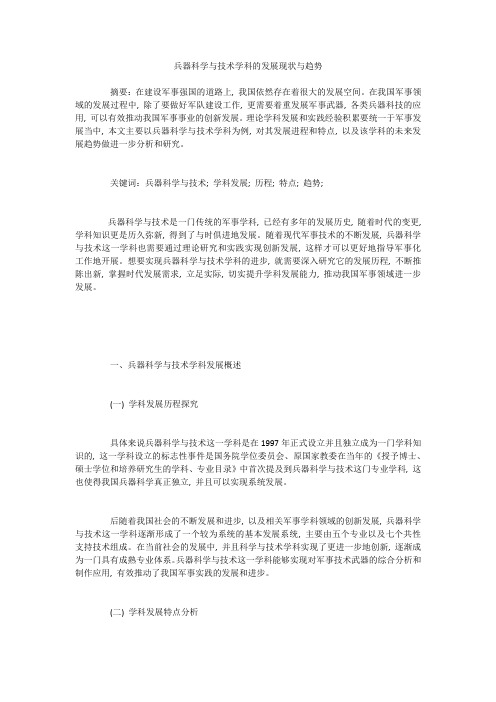
兵器科学与技术学科的发展现状与趋势摘要:在建设军事强国的道路上, 我国依然存在着很大的发展空间。
在我国军事领域的发展过程中, 除了要做好军队建设工作, 更需要着重发展军事武器, 各类兵器科技的应用, 可以有效推动我国军事事业的创新发展。
理论学科发展和实践经验积累要统一于军事发展当中, 本文主要以兵器科学与技术学科为例, 对其发展进程和特点, 以及该学科的未来发展趋势做进一步分析和研究。
关键词:兵器科学与技术; 学科发展; 历程; 特点; 趋势;兵器科学与技术是一门传统的军事学科, 已经有多年的发展历史, 随着时代的变更, 学科知识更是历久弥新, 得到了与时俱进地发展。
随着现代军事技术的不断发展, 兵器科学与技术这一学科也需要通过理论研究和实践实现创新发展, 这样才可以更好地指导军事化工作地开展。
想要实现兵器科学与技术学科的进步, 就需要深入研究它的发展历程, 不断推陈出新, 掌握时代发展需求, 立足实际, 切实提升学科发展能力, 推动我国军事领域进一步发展。
一、兵器科学与技术学科发展概述(一) 学科发展历程探究具体来说兵器科学与技术这一学科是在1997年正式设立并且独立成为一门学科知识的, 这一学科设立的标志性事件是国务院学位委员会、原国家教委在当年的《授予博士、硕士学位和培养研究生的学科、专业目录》中首次提及到兵器科学与技术这门专业学科, 这也使得我国兵器科学真正独立, 并且可以实现系统发展。
后随着我国社会的不断发展和进步, 以及相关军事学科领域的创新发展, 兵器科学与技术这一学科逐渐形成了一个较为系统的基本发展系统, 主要由五个专业以及七个共性支持技术组成。
在当前社会的发展中, 并且科学与技术学科实现了更进一步地创新, 逐渐成为一门具有成熟专业体系。
兵器科学与技术这一学科能够实现对军事技术武器的综合分析和制作应用, 有效推动了我国军事实践的发展和进步。
(二) 学科发展特点分析任何一门学科都会具备自身的特点, 兵器科学与技术这一学科在发展的过程中, 主要呈现出以下几个特点。
兵器科学与技术-北京理工大学机电学院

兵器科学与技术(082600)一、学科简介与研究方向本学科始建于二十世纪50年代初,是我国最早建立的国防特色学科专业。
1984年首次招收博士研究生,2007年评为国家重点一级学科,在2008年、2012年全国学科评估中均排名第一。
本学科已形成由院士、长江学者、国家杰青等知名专家学者为代表的学术造诣深厚、结构合理、团结协作、富于创新、贡献卓著的学术群体。
建有教育部科技创新团队和工信部国防科技创新团队,拥有国家重点、国防科技重点和教育部重点实验室,形成了高水平基础研究和技术创新研究平台。
本学科设以下6个研究方向:1.武器系统设计:武器系统设计理论与方法,武器系统总体设计与技术集成,武器系统分析、仿真、试验与评估,新概念新原理武器系统。
2.发射理论与技术:发射理论与方法,发射控制技术,发射动力学与振动控制,新型发射理论与技术,发射安全检测技术。
3.信息感知与控制技术:环境、目标信息感知与目标识别,武器的精确定位、导引与控制,瞬态信息处理与信息对抗,新原理、新体制探测与控制技术。
4.毁伤理论与弹药工程:毁伤理论与方法,弹道理论与技术,弹药及战斗部技术,目标毁伤及防护技术,灵巧与智能弹药技术。
5.爆炸毁伤技术:爆轰理论,含能材料点火、起爆及爆轰特性,炸药能量输出结构,新型毁伤理论与技术,目标毁伤机理,毁伤效应及评估,毁伤威力仿真与试验,爆炸测试技术。
6.特种能源理论与技术:特种能源化学理论,特种能源材料技术,特种能源动力技术与工程,特种物理化学效应及应用,特种能源系统安全性与可靠性工程。
二、培养目标培养坚持党的基本路线,具有国家使命感和社会责任心,热爱祖国,遵纪守法,品行端正,诚实守信,身心健康,富有科学精神和国际视野的高素质、高水平创新人才。
硕士研究生培养目标:掌握本学科坚实的基础理论和系统的专门知识,掌握本学科的现代实验方法和技能,具有从事科学研究工作或独立担负专门技术工作的能力,在科学研究或专门工程技术工作中具有一定的组织和管理能力,有良好的合作精神和较强的交流能力。
西安工业大学各研究生学科中英文名称对照

School of optoelectronics Engineering 光电工程学院光学工程 Optical Engineering(一级学科,博士点)仪器科学与技术 Instrument Science and Technology(一级学科)精密仪器及机械 Precision Instrument and Machinery测试计量技术及仪器 Measuring , Testing Technologies and Instruments微电子学与固体电子学 Microelectronics and Solid State Electronics兵器科学与技术Armament Science and Technology(一级学科)武器系统与运用工程Weapon Systems and Utilization Engineering兵器发射理论与技术Armament Launch Theory and Technology火炮、自动武器与弹药工程Artillery,Automatic Gun and Ammunition Engineering军事化学与烟火技术Military Chemistry and Pyrotechnics光学工程Optical Engineering(专业硕士)仪器仪表工程Instrument and Meter Engineering(专业硕士)兵器工程Arms Engineering (专业硕士)School of Mechatronic Engineering 机电工程学院机械工程 Mechanical Engineering(一级学科,博士点)机械制造及其自动化 Mechanical Manufacture and Automation机械电子工程 Mechatronic Engineering机械设计与理论 Mechanical Design and Theory车辆工程 Vehicle Engineering机械工程mechanical engineering(专业硕士)工业工程industrial engineering(专业硕士)School of Materials and Chemical Engineering 材料与化工学院材料科学与工程 Materials Science and Engineering(一级学科,博士点)材料物理与化学 Materials Physics and Chemistry材料学 Materialogy材料加工工程 Materials Processing Engineering材料工程Materials Engineering(专业硕士)School of Electronics and Information Engineering 电子信息工程学院信息与通信工程 Information and Communication Engineering(一级学科)通信与信息系统 Communication and Information Systems信号与信息处理 Signal and Information Processing控制科学与工程Control Science and Engineering(一级学科)控制理论与控制工程Control Theory and Control Engineering检测技术与自动化装置 Detection Technologyand Automatic Equipment系统工程Systems Engineering模式识别与智能系统Pattern Recognition and Intelligent Systems导航、制导与控制Navigation,Guidance and Control生物医学工程Biomedical Engineering(一级学科)控制工程Control Engineering(专业硕士)电子与通信工程Electronics and Communication Engineering(专业硕士)School of Economics and Management 经济管理学院管理科学与工程 Management Science and Engineering(一级学科)应用经济学 Applied Economics(一级学科)国民经济学National Economics区域经济学Regional Economics财政学(含税收学)Public Finance? including?Taxation)金融学(含保险学)Finance (including Insurance)产业经济学Industrial Economics国际贸易学International Trade劳动经济学Labor Economics统计学Statistics数量经济学Quantitative Economics国防经济学National Defense Economics工商管理学 Science of BusinessAdministration(一级学科)会计学Accounting企业管理学(含财务管理、市场营销学、人力资源管理学)Corporate Management (including Financial Management,Marketing,and Human Resources Management)旅游管理学Tourist Management技术经济及管理学echnology Economy and Management工商管理硕士(MBA)Master of Business Administration(专业硕士)项目管理工程project management engineering (专业硕士)物流工程logisticis engineering(专业硕士)会计accounting(专业硕士)School of Computer Science and Engineering计算机科学与工程学院计算机科学与技术 Computer Science and Technology(一级学科)计算机软件与理论 Computer Software and Theory计算机系统结构 Computer Systems Organization计算机应用技术 Computer Applied Technology计算机技术Computer Technology(专业硕士)软件工程Software Engineering(专业硕士)School of Architectural Engineering 建筑工程学院工程力学 Engineering Mechanics土木工程Civil Engineering(一级学科)岩土工程Geotechnical Engineering结构工程Structural Engineering市政工程Municipal Engineering供热、供燃气、通风及空工程Heating,Gas Supply,Ventilating and Air Conditioning Engineering防灾减灾工程及防护工程Disaster Prevention and?Reduction Engineering and Protective Engineering 桥梁与隧道工程 Bridge and Tunnel Engineering建筑与土木工程 architecture and civil engineering(专业硕士)School of Foreign Languages外国语学院外国语言学及应用语言学 Linguistics and Applied Linguistics in Foreign Languages人文学院 School of Arts and Humanities新闻与传播Journalism and Mass Communications(专业硕士)Department of teaching research of the theory of Ideological and political政治思想理论教学科研部马克思主义理论Marxist Theory(一级学科)马克思主义基本原理 Marxist basic theory马克思主义发展史history of Marxist马克思主义中国化研究 Study in Sinicizing Marxist国外马克思主义研究Study in Marxist abroad思想政治教育Education in Ideology and PoliticsSchool of Science 理学院物理学Physics(一级学科)理论物理 Theoretical Physics粒子物理与原子核物理Particle Physics and Nuclear Physics原子与分子物理 Atomic and Molecular Physics等离子体物理 Plasma Physics凝聚态物理Condensed Matter Physics声学 Acoustics光学 Optics无线电物理 RadioPhysics艺术与传媒学院the School of Art and Communication艺术Art(专业硕士)。
全国学科专业英文名称 之 工学类

工学 Engineering力学 Mechanics一般力学与力学基础 General and Fundamental Mechanics固体力学 Solid Mechanics流体力学 Fluid Mechanics工程力学 Engineering Mechanics机械工程 Mechanical Engineering机械制造及其自动化 Mechanical Manufacture and Automation机械电子工程 Mechatronic Engineering机械设计与理论 Mechanical Design and Theory车辆工程 Vehicle Engineering光学工程 Optical Engineering仪器科学与技术 Instrument Science and Technology精密仪器及机械 Precision Instrument and Machinery测试计量技术及仪器 Measuring and Testing Technologies and Instruments 材料科学与工程 Materials Science and Engineering材料物理与化学 Materials Physics and Chemistry材料学 Materialogy材料加工工程 Materials Processing Engineering冶金工程 Metallurgical Engineering冶金物理化学 Physical Chemistry of Metallurgy钢铁冶金 Ferrous Metallurgy有色金属冶金 Non-ferrous Metallurgy动力工程及工程热物理 Power Engineering and Engineering Thermophysics 工程热物理 Engineering Thermophysics热能工程 Thermal Power Engineering动力机械及工程 Power Machinery and Engineering流体机械及工程 Fluid Machinery and Engineering制冷及低温工程 Refrigeration and Cryogenic Engineering化工过程机械 Chemical Process Equipment电气工程 Electrical Engineering电机与电器 Electric Machines and Electric Apparatus电力系统及其自动化 Power System and its Automation高电压与绝缘技术 High Voltage and Insulation Technology电力电子与电力传动 Power Electronics and Power Drives电工理论与新技术 Theory and New Technology of Electrical Engineering 电子科学与技术 Electronics Science and Technology物理电子学 Physical Electronics电路与系统 Circuits and Systems微电子学与固体电子学 Microelectronics and Solid State Electronics电磁场与微波技术 Electromagnetic Field and Microwave Technology信息与通信工程 Information and Communication Engineering通信与信息系统 Communication and Information Systems信号与信息处理 Signal and Information Processing控制科学与工程 Control Science and Engineering控制理论与控制工程 Control Theory and Control Engineering检测技术与自动化装置 Detection Technology and Automatic Equipment系统工程 Systems Engineering模式识别与智能系统 Pattern Recognition and Intelligent Systems导航、制导与控制 Navigation, Guidance and Control计算机科学与技术 Computer Science and Technology计算机软件与理论 Computer Software and Theory计算机系统结构 Computer Systems Organization计算机应用技术 Computer Applied Technology建筑学 Architecture建筑历史与理论 Architectural History and Theory建筑设计及其理论 Architectural Design and Theory城市规划与设计(含风景园林规划与设计) Urban Planning and Design (includingLandscape Planning and Design)建筑技术科学 Building Technology Science土木工程 Civil Engineering岩土工程 Geotechnical Engineering结构工程 Structural Engineering市政工程 Municipal Engineering供热、供燃气、通风及空调工程 Heating, Gas Supply, Ventilating and AirConditioning Engineering防灾减灾工程及防护工程 Disaster Prevention and Reduction Engineering andProtective Engineering桥梁与隧道工程 Bridge and Tunnel Engineering水利工程 Hydraulic Engineering水文学及水资源 Hydrology and Water Resources水力学及河流动力学 Hydraulics and River Dynamics水工结构工程 Hydraulic Structure Engineering水利水电工程 Hydraulic and Hydro-Power Engineering港口、海岸及近海工程 Harbor, Coastal and Offshore Engineering测绘科学与技术 Surveying and Mapping大地测量学与测量工程 Geodesy and Survey Engineering摄影测量与遥感 Photogrammetry and Remote Sensing地图制图学与地理信息工程 Cartography and Geographic Information Engineering 化学工程与技术 Chemical Engineering and Technology化学工程 Chemical Engineering化学工艺 Chemical Technology生物化工 Biochemical Engineering应用化学 Applied Chemistry工业催化 Industrial Catalysis地质资源与地质工程 Geological Resources and Geological Engineering矿产普查与勘探 Mineral Resource Prospecting and Exploration地球探测与信息技术 Geodetection and Information Technology地质工程 Geological Engineering矿业工程 Mineral Engineering采矿工程 Mining Engineering矿物加工工程 Mineral Processing Engineering安全技术及工程 Safety Technology and Engineering石油与天然气工程 Oil and Natural Gas Engineering油气井工程 Oil-Gas Well Engineering油气田开发工程 Oil-Gas Field Development Engineering油气储运工程 Oil-Gas Storage and Transportation Engineering纺织科学与工程 Textile Science and Engineering纺织工程 Textile Engineering纺织材料与纺织品设计 Textile Material and Textiles Design纺织化学与染整工程 Textile Chemistry and Dyeing and Finishing Engineering 服装设计与工程 Clothing Design and Engineering轻工技术与工程 The Light Industry Technology and Engineering制浆造纸工程 Pulp and Paper Engineering制糖工程 Sugar Engineering发酵工程 Fermentation Engineering皮革化学与工程 Leather Chemistry and Engineering交通运输工程 Communication and Transportation Engineering道路与铁道工程 Highway and Railway Engineering交通信息工程及控制 Traffic Information Engineering & Control交通运输规划与管理 Transportation Planning and Management载运工具运用工程 Vehicle Operation Engineering船舶与海洋工程 Naval Architecture and Ocean Engineering船舶与海洋结构物设计制造 Design and Construction of Naval Architecture and Ocean Structure轮机工程 Marine Engine Engineering水声工程 Underwater Acoustics Engineering航空宇航科学与技术 Aeronautical and Astronautical Science and Technology飞行器设计 Flight Vehicle Design航空宇航推进理论与工程 Aerospace Propulsion Theory and Engineering航空宇航器制造工程 Manufacturing Engineering of Aerospace Vehicle人机与环境工程 Man-Machine and Environmental Engineering兵器科学与技术 Armament Science and Technology武器系统与运用工程 Weapon Systems and Utilization Engineering兵器发射理论与技术 Armament Launch Theory and Technology火炮、自动武器与弹药工程 Artillery, Automatic Gun and AmmunitionEngineering军事化学与烟火技术 Military Chemistry and Pyrotechnics核科学与技术 Nuclear Science and Technology核能科学与工程 Nuclear Energy Science and Engineering核燃料循环与材料 Nuclear Fuel Cycle and Materials核技术及应用 Nuclear Technology and Applications辐射防护及环境保护 Radiation and Environmental Protection农业工程 Agricultural Engineering农业机械化工程 Agricultural Mechanization Engineering农业水土工程 Agricultural Water-Soil Engineering农业生物环境与能源工程 Agricultural Biological Environmental and EnergyEngineering农业电气化与自动化 Agricultural Electrification and Automation林业工程 Forestry Engineering森林工程 Forest Engineering木材科学与技术 Wood Science and Technology林产化学加工工程 Chemical Processing Engineering of Forest Products环境科学与工程 Environmental Science and Engineering环境科学 Environmental Science环境工程 Environmental Engineering生物医学工程 Biomedical Engineering食品科学与工程 Food Science and Engineering食品科学 Food Science粮食、油脂及植物蛋白工程 Cereals, Oils and Vegetable Protein Engineering 农产品加工及贮藏工程 Processing and Storage of Agriculture Products水产品加工及贮藏工程 Processing and Storage of Aquatic Products。
兵器科学与技术

兵器科学与技术(082600)一、学科简介与研究方向本学科始建于二十世纪50年代初,是我国最早建立的国防特色学科专业。
1984年首次招收博士研究生,2007年评为国家重点一级学科,在2008年、2012年全国学科评估中均排名第一。
本学科已形成由院士、长江学者、国家杰青等知名专家学者为代表的学术造诣深厚、结构合理、团结协作、富于创新、贡献卓著的学术群体。
建有教育部科技创新团队和工信部国防科技创新团队,拥有国家重点、国防科技重点和教育部重点实验室,形成了高水平基础研究和技术创新研究平台。
本学科设以下6个研究方向:1.武器系统设计:武器系统设计理论与方法,武器系统总体设计与技术集成,武器系统分析、仿真、试验与评估,新概念新原理武器系统。
2.发射理论与技术:发射理论与方法,发射控制技术,发射动力学与振动控制,新型发射理论与技术,发射安全检测技术。
3.信息感知与控制技术:环境、目标信息感知与目标识别,武器的精确定位、导引与控制,瞬态信息处理与信息对抗,新原理、新体制探测与控制技术。
4.毁伤理论与弹药工程:毁伤理论与方法,弹道理论与技术,弹药及战斗部技术,目标毁伤及防护技术,灵巧与智能弹药技术。
5.爆炸毁伤技术:爆轰理论,含能材料点火、起爆及爆轰特性,炸药能量输出结构,新型毁伤理论与技术,目标毁伤机理,毁伤效应及评估,毁伤威力仿真与试验,爆炸测试技术。
6.特种能源理论与技术:特种能源化学理论,特种能源材料技术,特种能源动力技术与工程,特种物理化学效应及应用,特种能源系统安全性与可靠性工程。
二、培养目标培养坚持党的基本路线,具有国家使命感和社会责任心,热爱祖国,遵纪守法,品行端正,诚实守信,身心健康,富有科学精神和国际视野的高素质、高水平创新人才。
硕士研究生培养目标:掌握本学科坚实的基础理论和系统的专门知识,掌握本学科的现代实验方法和技能,具有从事科学研究工作或独立担负专门技术工作的能力,在科学研究或专门工程技术工作中具有一定的组织和管理能力,有良好的合作精神和较强的交流能力。
兵器科学技术概述
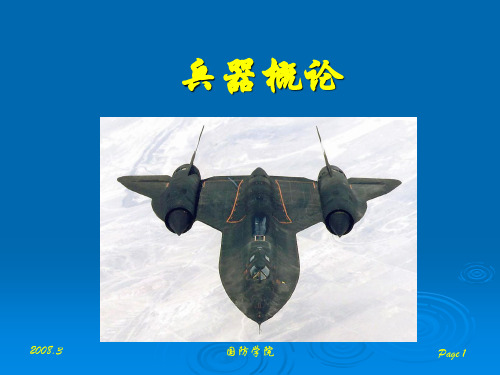
(2)时间短扩展空间大,作战目标明确
(3)新武器应用,负影响较大
(4)广泛使用C4ISR系统,实现战场指挥自动化
2008.3
国防学院
Page 5
现代战争对兵器的要求
(1)精确打击能力 (2)远程攻击能力 (3)高效毁伤能力 (4)全天时和全天候的作战能力 (5)良好的隐身、机动和防护能力
现代兵器系统主要作战功能
2008.3
国防学院
Page 6
第二章弹药技术
本章主要内容:
弹药的定义及结构原理 弹药战斗部的分类及作用 引信技术 火工烟火技术
2008.3
国防学院
Page 7
2.1 弹药的定义及结构原理 弹药的定义
广义讲是指在战斗中投向敌人的各种抛射和非抛射 物品。作为军用常规弹药可以定义为各种具有杀伤 能力或其它特殊作用的爆炸物。 弹药目的是对所选定的目标产生所需要的作用,将 目标最有效的毁伤,使其失去或降低战斗功能。
2008.3 国防学院 Page 15
火工品的可靠性技术 1、火工品的可靠性设计 2、火工品的可靠性评估
2008.3
国防学院
Page 16
第二章弹药技术
本章主要内容:
弹药及其发展 弹药的组成及分类 火炮 引信
2008.3
国防学院
Page 17
1.1弹药及其发展 弹药的定义 “弹药”一词最早来自法语,意思是战争之需。 弹药,一般指有壳体,装有火药、炸药或其它 装填物,能对目标起毁伤作用或完成其他任 务的军械物品。 弹药的发展 1.弹药的发展历史 2.弹药的发展趋势
2008.3
国防学院
Page 11
外部控 制信息
目标环 境信息
大学专业英文翻译
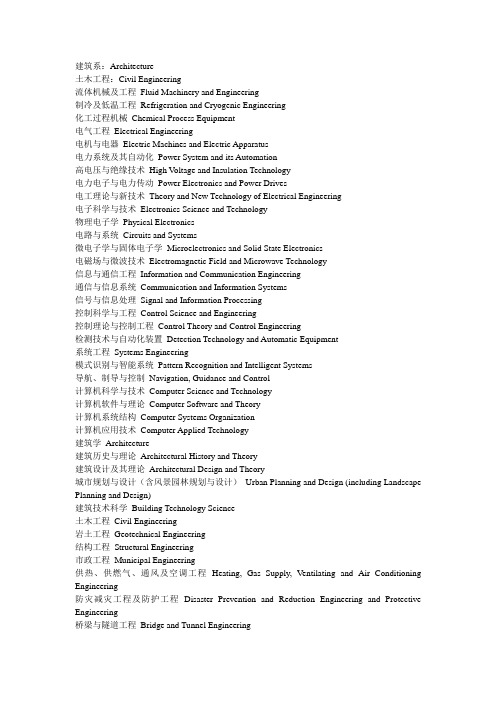
建筑系:Architecture土木工程:Civil Engineering流体机械及工程Fluid Machinery and Engineering制冷及低温工程Refrigeration and Cryogenic Engineering化工过程机械Chemical Process Equipment电气工程Electrical Engineering电机与电器Electric Machines and Electric Apparatus电力系统及其自动化Power System and its Automation高电压与绝缘技术High V oltage and Insulation Technology电力电子与电力传动Power Electronics and Power Drives电工理论与新技术Theory and New Technology of Electrical Engineering电子科学与技术Electronics Science and Technology物理电子学Physical Electronics电路与系统Circuits and Systems微电子学与固体电子学Microelectronics and Solid State Electronics电磁场与微波技术Electromagnetic Field and Microwave Technology信息与通信工程Information and Communication Engineering通信与信息系统Communication and Information Systems信号与信息处理Signal and Information Processing控制科学与工程Control Science and Engineering控制理论与控制工程Control Theory and Control Engineering检测技术与自动化装置Detection Technology and Automatic Equipment系统工程Systems Engineering模式识别与智能系统Pattern Recognition and Intelligent Systems导航、制导与控制Navigation, Guidance and Control计算机科学与技术Computer Science and Technology计算机软件与理论Computer Software and Theory计算机系统结构Computer Systems Organization计算机应用技术Computer Applied Technology建筑学Architecture建筑历史与理论Architectural History and Theory建筑设计及其理论Architectural Design and Theory城市规划与设计(含风景园林规划与设计)Urban Planning and Design (including Landscape Planning and Design)建筑技术科学Building Technology Science土木工程Civil Engineering岩土工程Geotechnical Engineering结构工程Structural Engineering市政工程Municipal Engineering供热、供燃气、通风及空调工程Heating, Gas Supply, Ventilating and Air Conditioning Engineering防灾减灾工程及防护工程Disaster Prevention and Reduction Engineering and Protective Engineering桥梁与隧道工程Bridge and Tunnel Engineering水利工程Hydraulic Engineering水文学及水资源Hydrology and Water Resources水力学及河流动力学Hydraulics and River Dynamics水工结构工程Hydraulic Structure Engineering水利水电工程Hydraulic and Hydro-Power Engineering港口、海岸及近海工程Harbor, Coastal and Offshore Engineering测绘科学与技术Surveying and Mapping大地测量学与测量工程Geodesy and Survey Engineering摄影测量与遥感Photogrammetry and Remote Sensing地图制图学与地理信息工程Cartography and Geographic Information Engineering 化学工程与技术Chemical Engineering and Technology化学工程Chemical Engineering化学工艺Chemical Technology生物化工Biochemical Engineering应用化学Applied Chemistry工业催化Industrial Catalysis地质资源与地质工程Geological Resources and Geological Engineering矿产普查与勘探Mineral Resource Prospecting and Exploration地球探测与信息技术Geodetection and Information Technology地质工程Geological Engineering矿业工程Mineral Engineering采矿工程Mining Engineering矿物加工工程Mineral Processing Engineering安全技术及工程Safety Technology and Engineering石油与天然气工程Oil and Natural Gas Engineering油气井工程Oil-Gas Well Engineering油气田开发工程Oil-Gas Field Development Engineering油气储运工程Oil-Gas Storage and Transportation Engineering纺织科学与工程Textile Science and Engineering纺织工程Textile Engineering纺织材料与纺织品设计Textile Material and Textiles Design纺织化学与染整工程Textile Chemistry and Dyeing and Finishing Engineering服装设计与工程Clothing Design and Engineering轻工技术与工程The Light Industry Technology and Engineering制浆造纸工程Pulp and Paper Engineering制糖工程Sugar Engineering发酵工程Fermentation Engineering皮革化学与工程Leather Chemistry and Engineering交通运输工程Communication and Transportation Engineering道路与铁道工程Highway and Railway Engineering交通信息工程及控制Traffic Information Engineering & Control交通运输规划与管理Transportation Planning and Management载运工具运用工程Vehicle Operation Engineering船舶与海洋工程Naval Architecture and Ocean Engineering船舶与海洋结构物设计制造Design and Construction of Naval Architecture and Ocean Structure轮机工程Marine Engine Engineering水声工程Underwater Acoustics Engineering航空宇航科学与技术Aeronautical and Astronautical Science and Technology飞行器设计Flight Vehicle Design航空宇航推进理论与工程Aerospace Propulsion Theory and Engineering航空宇航器制造工程Manufacturing Engineering of Aerospace Vehicle人机与环境工程Man-Machine and Environmental Engineering兵器科学与技术Armament Science and Technology武器系统与运用工程Weapon Systems and Utilization Engineering兵器发射理论与技术Armament Launch Theory and Technology火炮、自动武器与弹药工程Artillery, Automatic Gun and Ammunition Engineering军事化学与烟火技术Military Chemistry and Pyrotechnics核科学与技术Nuclear Science and Technology核能科学与工程Nuclear Energy Science and Engineering核燃料循环与材料Nuclear Fuel Cycle and Materials核技术及应用Nuclear Technology and Applications辐射防护及环境保护Radiation and Environmental Protection农业工程Agricultural Engineering农业机械化工程Agricultural Mechanization Engineering农业水土工程Agricultural Water-Soil Engineering农业生物环境与能源工程Agricultural Biological Environmental and Energy Engineering农业电气化与自动化Agricultural Electrification and Automation林业工程Forestry Engineering森林工程Forest Engineering木材科学与技术Wood Science and Technology林产化学加工工程Chemical Processing Engineering of Forest Products环境科学与工程Environmental Science and Engineering环境科学Environmental Science环境工程Environmental Engineering生物医学工程Biomedical Engineering食品科学与工程Food Science and Engineering食品科学Food Science粮食、油脂及植物蛋白工程Cereals, Oils and Vegetable Protein Engineering农产品加工及贮藏工程Processing and Storage of Agriculture Products水产品加工及贮藏工程Processing and Storage of Aquatic Products农学Agriculture作物学Crop Science作物栽培学与耕作学Crop Cultivation and Farming System作物遗传育种学Crop Genetics and Breeding园艺学Horticulture果树学Pomology蔬菜学Olericulture茶学Tea Science农业资源利用学Utilization Science of Agricultural Resources土壤学Soil Science植物营养学Plant Nutrition植物保护学Plant Protection植物病理学Plant Pathology农业昆虫与害虫防治Agricultural Entomology and Pest Control农药学Pesticide Science畜牧学Animal Science动物遗传育种与繁殖Animal Genetics, Breeding and ReproductionScience动物营养与饲料科学Animal Nutrition and Feed Science草业科学Practaculture Science特种经济动物饲养学(含蚕、蜂等)The Rearing of Special-type EconomicAnimals (including Silkworm, Honeybees, etc.)兽医学Veterinary Medicine基础兽医学Basic Veterinary Medicine预防兽医学Preventive Veterinary Medicine临床兽医学Clinical Veterinary Medicine林学Forestry林木遗传育种学Forest Tree Genetics and Breeding森林培育学Silviculture森林保护学Forest Protection森林经理学Forest Management野生动植物保护与利用Wildlife Conservation and Utilization园林植物与观赏园艺Ornamental Plants and Horticulture水土保持与荒漠化防治Soil and Water Conservation and Desertification Combating水产学Fisheries Science水产养殖学Aquaculture Science捕捞学Fishing Science渔业资源学Science of Fisheries Resources医学Medicine基础医学Basic Medicine人体解剖与组织胚胎学Human Anatomy, Histology and Embryology免疫学Immunology病原生物学Pathogenic Organisms病理学与病理生理学Pathology and Pathophysiology法医学Forensic Medicine放射医学Radiation Medicine航空航天与航海医学Aerospace and Nautical medicine临床医学Clinical Medicine内科学(含心血管病学、血液病学、呼吸系病学、消化系病学、内分泌与代谢病学、肾脏病学、风湿病学、传染病学)Internal medicine (including Cardiology, Hematology, Respiratory, Gastroenterology, Endocrinology and Metabolism, Nephrology, Rheuma-tology, InfectiousDiseases)儿科学Pediatrics老年医学Geriatrics神经病学Neurology精神病与精神卫生学Psychiatry and Mental Health皮肤病与性病学Dermatology and Venereology影像医学与核医学Imaging and Nuclear Medicine临床检验诊断学Clinical Laboratory Diagnostics护理学Nursing外科学(含普通外科学、骨外科学、泌尿外科学、胸心血管外科学、神经外科学、整形外科学、烧伤外科学、野战外科学)Surgery (General Surgery, Orthopedics, Urology, Cardiothoracic Surgery, Neurosurgery, Plastic Surgery, Burn Surgery, Field Surgery)妇产科学Obstetrics and Gynecology眼科学Ophthalmic Specialty耳鼻咽喉科学Otolaryngology肿瘤学Oncology康复医学与理疗学Rehabilitation Medicine & Physical Therapy运动医学Sports Medicine麻醉学Anesthesiology急诊医学Emergency Medicine口腔医学Stomatology口腔基础医学Basic Science of Stomatology口腔临床医学Clinical Science of Stomatology公共卫生与预防医学Public Health and Preventive Medicine流行病与卫生统计学Epidemiology and Health Statistics劳动卫生与环境卫生学Occupational and Environmental Health营养与食品卫生学Nutrition and Food Hygiene儿少卫生与妇幼保健学Maternal, Child and Adolescent Health卫生毒理学Hygiene Toxicology军事预防医学Military Preventive Medicine中医学Chinese Medicine中医基础理论Basic Theories of Chinese Medicine仪器科学与光电工程学院 School of Instrument Science and Opto-electronic Engineering1、测控技术与仪器 Measurement & Control Technology and Instrument2、光信息科学与技术 Optic Information Science & Technology机械与汽车工程学院 School of Machinery and Automobile Engineering3、车辆工程 Vehicles Engineering4、工业工程 Industrial Engineering5、工业设计 Industry Design6、过程装备与控制工程 Process Equipment & Control Engineering7、机械设计制造及其自动化 Machine Design & Manufacture & Its Automation8、交通工程 Transportation Engineering9、热能与动力工程 Thermal Energy & Power Engineering材料科学与工程学院 School of Material Science and Engineering10、金属材料工程 Metal Materials Engineering11、材料物理 Materials Physics12、无机非金属材料工程 Inorganic Non-metallic Materials Engineering13、材料成型及控制工程 Material Forming & Control Engineering电气与自动化工程学院 School of Electric Engineering and Automation14、电气工程及其自动化 Electric Engineering and Automation15、生物医学工程 Biomedical Engineering16、自动化 Automation计算机与信息学院 School of Computer and Information17、计算机科学与技术 Computer Science & Technology18、电子信息工程 Electronic Information Engineering19、电子信息科学与技术 Electronic Information Science & Technology20、通信工程 Communications Engineering21、信息安全Information Security化学工程学院 School of Chemical Engineering22、高分子材料与工程 Macromolecule Material and Engineering23、化学工程与工艺 Chemical Engineering and Technics24、制药工程 Pharmacy Engineering25、应用化学 Applied Chemistry土木建筑工程学院 School of Civil Engineering26、给排水工程 Water Supply & Drainage Engineering27、工程力学 Engineering Mechanics28、水利水电工程 Hydraulic and Hydro-Power Engineering29、土木工程 Civil Engineering30、建筑环境与设备工程 Architectural Environment & Equipment Engineering 建筑与艺术学院 School of Architecture and Arts31、城市规划 Urban Planning32、建筑学 Architecture33、艺术设计 Artistic Design资源与环境学院 School of Resources and Environment34、地理信息系统 Geographic Information System35、环境工程 Environment Engineering36、勘查技术与工程 Exploration Technology & Engineering37、资源勘查工程 Resources Exploration Engineering理学院 School of Sciences38、电子科学与技术 Electronic Science & Technology39、数学与应用数学 Applied Mathematics40、微电子学 Microelectronics41、信息与计算科学 Science of Information & Computation42、应用物理学 Applied Physics管理学院 School of Management43、电子商务 Electronic Commerce44、会计学 Accounting45、工商管理 Business Management46、劳动与社会保障 Labour and Social Security47、信息管理与信息系统 Information Management & System48、旅游管理 Tourism Management49、市场营销 Marketing人文经济学院 School of Humanities and Economics50、财政学 Finance51、广告学 Advertisement52、国际经济与贸易 International Economy & Trade53、经济学 Economics54、思想政治教育 Education in Ideology and Politics55、英语 English56、法学 Law57、社会工作 Social Work生物与食品工程学院 School of Biotechnology and Food Engineering58、生物工程 Bioengineering59、生物技术 Biotechnology60、食品科学与工程 Food Science and Engineering。
武器装备学院招生一览
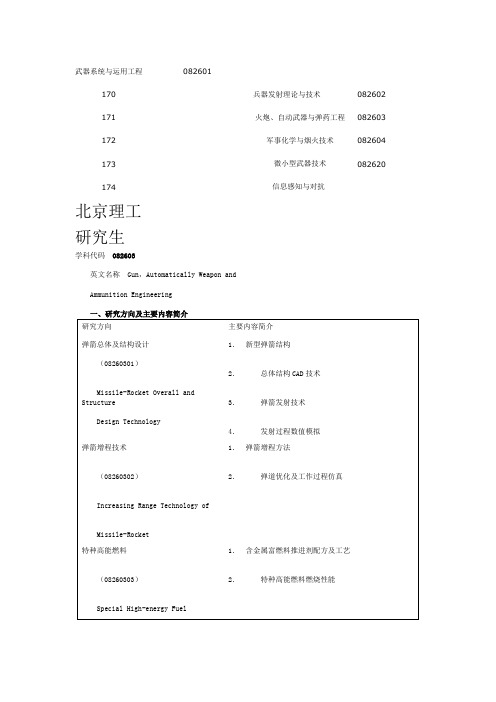
武器系统与运用工程082601
170 兵器发射理论与技术082602 171 火炮、自动武器与弹药工程082603 172 军事化学与烟火技术082604 173 微小型武器技术082620 174 信息感知与对抗
北京理工
研究生
“兵器科学与技术”1998年被批准按一级学科招收博士生,2007年被批准为国家重点学科。
本学科下设六个博士点,最早的博士点建于1984年1月。
本学科从事的研究工作涉及力学、机械、无线电、化学、光学、电子学等学术领域。
经过长期的建设和发展,不断优化学科队伍的知识结构和梯队层次,本学科点已形成由知名教授为学科带头人、学术造诣深、知识结构合理、年龄职称协调、团结协作精神好的学术队伍。
其中:中国工程院院士2人,长江学者特聘教授1人,跨世纪人才1人,国家级突出贡献中青年科技专家3人;教授48人,博士生指导教师37人;具有博士学位的教师占教师总数的73.5%。
本学科已形成应用基础研究创新能力和工程应用能力的良性循环机制。
本学科点为国民经济建设和国防建设做出了重要贡献。
通过多年建设,本学科点形成以“爆炸科学与技术国家重点实验室”和“引信动态特性国防科技重点实验室”为科研和教学基地,拥有先进的实验设备和充足的科研经费,为培养高质量的学生和创造高水平的科研成果,奠定了坚实的基础,创造了良好的环境。
本学科不断完善和改革人才培养方案,重点加强基础理论、哲学、方法论方面知识的提升,突出创新意识和能力的培养。
本学科毕业研究生大部分在兵器、部队、航天、国有或民办公司等领域从事科学研究、教学、科技管理等工作。
兵器材料科学与工程

兵器材料科学与工程兵器材料科学与工程是一门研究军事装备所需材料的学科,它涉及到材料的性能、制备、加工、应用等方面。
兵器材料的研究对于提高军事装备的性能、延长使用寿命、降低成本都具有重要意义。
首先,兵器材料的选择对于军事装备的性能至关重要。
不同的兵器装备需要不同的材料来满足其特定的使用要求。
比如,战斗机需要轻质、高强度的材料来保证其飞行性能,而坦克则需要耐磨、抗冲击的材料来保证其在战场上的生存能力。
因此,兵器材料科学与工程需要深入研究不同材料的性能及其在不同兵器装备上的应用。
其次,兵器材料的制备和加工技术对于提高装备性能至关重要。
材料的制备工艺直接影响着材料的性能,而加工技术则决定了材料的成型和加工难度。
兵器材料科学与工程需要不断探索新的制备工艺和加工技术,以提高材料的性能和降低成本。
比如,采用先进的合金制备技术可以提高材料的强度和耐腐蚀性能,而先进的加工技术则可以提高材料的成型精度和表面质量。
最后,兵器材料的应用研究对于提高装备的性能和延长使用寿命具有重要意义。
兵器装备在使用过程中会受到各种外界环境和力的影响,因此材料的耐久性和稳定性是至关重要的。
兵器材料科学与工程需要研究不同材料在不同环境下的性能表现,以指导装备的使用和维护。
比如,研究材料在高温、低温、高压、高速等极端环境下的性能变化,可以为装备的设计和使用提供重要的参考依据。
综上所述,兵器材料科学与工程是一门重要的学科,它对于提高军事装备的性能、延长使用寿命、降低成本都具有重要意义。
通过深入研究材料的性能、制备、加工和应用,可以不断提高装备的性能和可靠性,为国防事业做出重要贡献。
希望在不久的将来,兵器材料科学与工程能够取得更大的突破,为我国的军事装备发展提供更多的支持和保障。
- 1、下载文档前请自行甄别文档内容的完整性,平台不提供额外的编辑、内容补充、找答案等附加服务。
- 2、"仅部分预览"的文档,不可在线预览部分如存在完整性等问题,可反馈申请退款(可完整预览的文档不适用该条件!)。
- 3、如文档侵犯您的权益,请联系客服反馈,我们会尽快为您处理(人工客服工作时间:9:00-18:30)。
Armament Science and Technology兵器科学与技术(082600)1.Overview of the ProgramThe Armament Science and Technology Discipline,founded in1950s,is the earliest national defense discipline in China and has been qualified to recruit PhD students since 1984. In 2007, it is awarded the national first-level discipline and ranks Top 1 in the national assessments in 2008, 2012, and 2017. The discipline now takes pride in our research groups with profound academic knowledge, reasonable structure, solidify cooperation, innovation, and outstanding contributions, and is led by a lot of talent researchers including academician, Chang Jiang scholars, National Outstanding Experts, etc. The discipline consists of the Science and Technology Innovation Team and the National Defense Science and Technology Innovation Team honored by Ministry of Education and the Ministry of Industry Information Technology. Together with National Key Laboratory, National Defense Science and Technology Key Laboratory, and the Key Laboratory of the Ministry of Education, a high-level innovative research platform is provided.The Armament Science and Technology is consist of six secondary disciplines as following:(1) Weapon Design and Application Engineering. It mainly studies theory and method of weapon system design, weapon integration and system confrontation, integrated design of weapon and platform, weapon launch and ballistic planning, unmanned aerial vehicle system technology, intelligent robot, precision guided weapon, intelligent and dexterous weapon cross-domain coordination accusation technology and new probability, the new concept of system, and so on.(2) Damage Technology and Ammunition Engineering. It mainly studies damage mechanism and theory, warhead technology, ammunition design theory, damage assessment, integrated damage, ammunition and platform integration, photo electricity and magnetic damage, cyber damage, new concept of damage, and so on.(3) Explosion Theory and Impact Engineering. It mainly studies theory of detonation and explosion, shock dynamics of material and structure, theory and application of high speed penetration, calculation of explosion mechanics, shock wave physics and chemistry, underwater explosion and impact,mechanism of biological damage, hypervelocity collision, new concept explosion theory, and so on. (4) Energetic Materials and Special Energy. It mainly studies high energy density compounds, green energetic compounds, high energy mixed explosives, complex system energetic materials, high active energy storage materials, high efficiency functional materials, advanced pyrotechnics, military pyrotechnics and materials, special energy devices and materials, solid state storage batteries and materials, new concept energetic materials, new concepts of energy, and so on.(5) Target Detection and Ammunition Information. It mainly studies target detection, ammunition intelligent control, weapon terminal information confrontation, ammunition information, intelligent information processing, intelligent cluster technology, damage control, single soldier equipment digitalization, new concept of detection technology, and so on.(6) Safety Technology and Protection Engineering. It mainly studies design of weapon safety, ammunition safety technology, protection theory and technology, advanced protective material and structure, intelligent security technology, anti-terrorism and explosion-proof technology, wearable protection, new concept of protection technology, and so on.2.Training TargetThe target is to train high-level innovative talents who have good knowledge of international common sense, with the ability of spreading Chinese and foreign cultures occupied, so that to bring international graduate students into full play as a cultural bridge.3.Length of SchoolingThe basic length of schooling for master students is 2 years. In principle, students should complete the courses in the first academic year. Thesis work time should not be less than one year. The maximum length of study for master students is extended by 0.5 years on the basis of 2 years. The basic length of schooling for Ph.D. students is 4 years. In principle, students should complete the courses in the first academic year. Thesis work time should not be less than three years. The maximum length of study for Ph.D. students is extended by 2 years on the basis of 4 years.4.Curriculum and Credit RequirementsNotes:1. Public Course(1) Chinese Language: Set by International Students Center of BIT. All international students must take this compulsory course.(2) Outline of China: Set by International Students Center of BIT. All international students must take this compulsory course.2. Major Basic CoursesDifferent Programs can set their own Major Basic Course.3. Optional Course(1) Major Core CoursesDifferent Programs can set their own Major Core Course.(2) Major Optional courseMaster international students must take two optional courses of their own Program. Under theguidance of the supervisor, Master international students can take undergraduate courses if needed. Ph.D. international students can take undergraduate courses if needed.5.Practice Part1. Academic Activity (1 credit)International Graduate Students need to participate in academic activities, academic lectures and academic conferences of their own fields. Giving oral speeches on academic conferences, whether on or off campus, are highly recommended.2. Innovative Practice (1 credit)International Graduate Students should take scientific research training and social practices during their training period, which should be carried-out and evaluated by supervisors.6.The Dissertation Related Work1. Literature Review & Opening ReportUnder the guidance of the supervisor, International Graduate Students should pick a research direction as well as reading certain amount reference books, both Chinese or foreign languages, at the same time.Master students should write a literature review, no less than 4000 words, based on the reading of over 30 papers , both Chinese or foreign languages, of their own research field.Ph.D. students should write a literature review, no less than 5000 words, based on the reading of over 50 papers , both Chinese or foreign languages, of their own research field.On the basis of the Literature Review, the Opening Report should mainly introduce following factors: research target, research meaning, methods of research, technical route, implementary plan, arrangements and expected results.2. Mid-Term EvaluationSchools organize Mid-Term Evaluation for International Students, which includes the evaluations of course study, literature review, opening report and the research progress of publishing papers and writing of Degree thesis.3. Thesis Writing and Thesis Pre-Defense(for Ph.D. students)International Graduate Students should complete a Degree thesis under the guidance of supervisors.Ph.D. students can take the Thesis Pre-Defense after finishing a supervisor-approved first draft.4. Thesis DefenseAfter thesis approved and the Sub- Committee of Degree Assessment authorized, International Graduate Students can take the Thesis-Defense.5. Degree ConfermentInternational students should acquire certain academic results as regulated when applying for a Master or Ph.D. Degree. Each program should clarify the categories of Master Degree and Ph.D. Degree.Time nodes of relevant procedure7.Course SyllabusCourse Code,Course Name,Class Hour,Credits,Course Description and Course Target,Teaching Method,Evaluation and Exams,Suitable Specialty,Prerequisites,Course Contents,Reference.。
